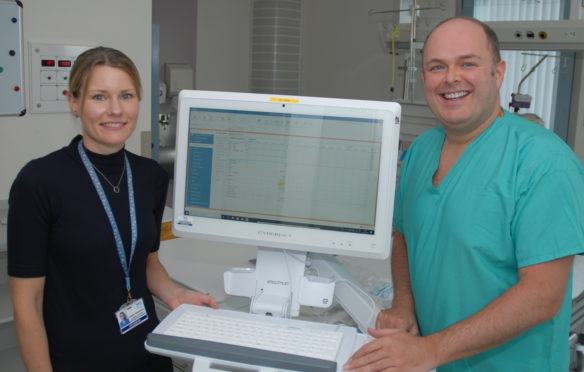A high-tech computer system has replaced traditional bedside charts at Aberdeen Royal Infirmary.
Thanks to a £700,000 investment from the NHS Grampian Endowment Fund, details will be transferred automatically rather than through pen and paper.
It is believed the upgrade will improve patient safety and save hours of staff time each week.
ICU clinical director, Dr Iain MacLeod, said that at the heart of the decision to implement the system was “patient safety.”
He added: “The system records physical measurements like blood pressure and heart rate as well as blood results and parameters from the various machines used in ICU, such as dialysis machines and ventilators.
“It will also save on staff time.
“Currently medical staff members waste lots of time transcribing blood results from a computer onto sheets of paper.
“The new system allows this to happen automatically.
“That’s great from a time-saving point of view but more importantly there will be a reduction in the errors that can happen when writing something down.”
The ICU at Aberdeen Royal Infirmary treats around 800 patients every year plus a further 400 cardiac patients.
Clinical information systems manager for ICU, Lieneke van Beijma, said: “All the information automatically arrives in the system, making the lives of nurses and doctors easier, with a full digital patient record and electronic prescription system.
“This replaces the traditional bedside chart – it’s all in the computer system.”
The health board’s Endowment Fund team works with a range of healthcare professionals, including doctors, nurses and service managers, to provide advanced medical equipment to hospitals, fund research and make patients’ stays in hospital more comfortable.
Fellow ICU consultant, Dr Andrew Clarkin, who led the project to install the new equipment stressed the importance of the fund.
He said: “Charitable Endowments have paid for this project and improvement in patient safety. Without that money, this would not have happened.
“Often families or former patients want to give money back to the unit and want to help future patients and genuinely this is something that will have a huge patient benefit.
“We need to say a huge thank you to the Endowment fund and those who have donated to it.”
NHS Grampian’s £700,000 upgrade is the latest step in its continuing digitisation of the health service, which will have a raft of benefits for patients.
Authorities across the country are increasingly looking towards new technology to help hospital stays run more smoothly – meaning the days of ward sisters regularly inspecting details on a pristine clipboard hooked over the end of a patient’s bed are coming to an end.
A 2017 study conducted in Oxfordshire found that replacing paper notes with a tablet shaved around one-third off the time it took to update someone’s vital signs.
Meanwhile, Great Ormond Street Hospital in London has moved to a digital bedside service, meaning clinicians can check on their patients wherever they are in the hospital.
It also allows them to see at a glance who may need emergency attention or prioritisation during their next round on the wards.
In recent years, some English health boards have begun issuing staff with iPods and mobile phones to help them note down data on the move.
In turn, the data can be viewed remotely – removing the reliance on a single copy of a document and allowing it to be shared with care providers instantly.
Elsewhere, authorities are considering using bedside televisions to share medical information such as scans or x-rays with patients.

